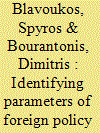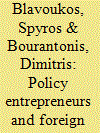|
|
|
Sort Order |
|
|
|
Items / Page
|
|
|
|
|
|
|
| Srl | Item |
| 1 |
ID:
103994


|
|
|
|
|
| Publication |
2011.
|
| Summary/Abstract |
Which parameters affect coalition building in budgetary negotiations? In this article, three distinct levels of analysis are identified to account for coalition building patterns, associated with domestic politics, domestic socioeconomic structures and EU politics. At the level of domestic politics, ideology points to cross-governmental affinity of a partisan nature; at the level of socioeconomic structures, similarity of policy interests, generated by cross-national socioeconomic convergence with EU policy standards, informs coalition formation patterns; at the EU politics level, the intergovernmental power balance influences the political aspirations of each Member State in the integration process and coalition-building decisions. Two sets of parameters affect the evolution of EU coalition patterns, corresponding to the integration impact on the EU (new cleavages) and on the Member States (the impact of Europeanisation). This analytical framework is used to examine the southern coalition (Spain, Greece, Portugal) in the four multi-annual financial frameworks (1988, 1992, 1999 and 2005).
|
|
|
|
|
|
|
|
|
|
|
|
|
|
|
|
| 2 |
ID:
138767


|
|
|
|
|
| Summary/Abstract |
This paper examines foreign policy change, identifying structural parameters of domestic and international origins that bring about major foreign policy shifts. Domestic structural parameters comprise the politico-institutional setting and advocacy groups in support of alternative foreign policy options. International structural parameters refer on the one hand to systemic changes that may bring about foreign policy realignment and, on the other hand, to the country’s role in the international system and its interactions with other countries that may activate foreign policy changes. We posit that this eclectic approach is necessary to account for major, multidimensional and complex, foreign policy decisions. We use this analytical framework to examine the Israeli re-orientation that enabled the signing of the Oslo Peace Agreement in the early 1990s.
|
|
|
|
|
|
|
|
|
|
|
|
|
|
|
|
| 3 |
ID:
156548


|
|
|
|
|
| Summary/Abstract |
In May 2011, the United Nations General Assembly (UNGA) passed Resolution 65/276 that enhances the European Union (EU) institutional mode of representation in the UNGA and other multilateral fora operating under its auspices. This followed an earlier, failed attempt that caused much embarrassment and political turmoil in the EU. The article examines the politics of this resolution, tracing its background logic, its origins and the political interactions in the UN that eventually led to its almost consensual embracement. It accounts for the failure in the first stage of the negotiations and how the EU responded to it, adjusting its bargaining strategy accordingly. This case study contributes to the better understanding of the links between intra-EU coherence and EU effectiveness as an international actor. We posit that there is one additional dimension of EU coherence not fully captured in the relevant literature. We distinguish between genuine coherence and generated coherence. The former entails homogeneity, or at least a significant degree of a priori convergence among EU member-states. The latter refers to EU positions that have emerged after hard and protracted intra-EU negotiations. The two types differ in the degree of flexibility bestowed on the EU in international negotiations.
|
|
|
|
|
|
|
|
|
|
|
|
|
|
|
|
| 4 |
ID:
115029


|
|
|
|
|
| Publication |
2012.
|
| Summary/Abstract |
Besides systemic changes that lead to the re-prioritization of foreign policy objectives, foreign policy change is also a result of domestic policy entrepreneurs' pursuit of a political return. Their potential to orchestrate change depends on the existing entry barriers that emanate from the political and institutional features of the domestic policy-making process. It is accentuated by system-wide developments and security crises that illustrate old policy failure. This article discusses the role of policy entrepreneurs in foreign policy change by reference to the Greek-Turkish rapprochement in the late 1990s that resulted in Turkey receiving the status of EU candidate country in 1999.
|
|
|
|
|
|
|
|
|
|
|
|
|
|
|
|
|
|
|
|
|